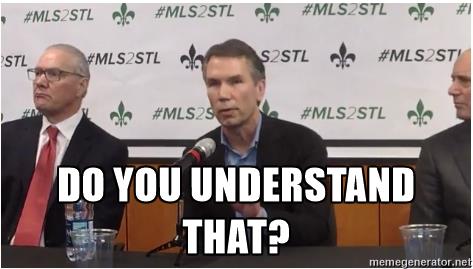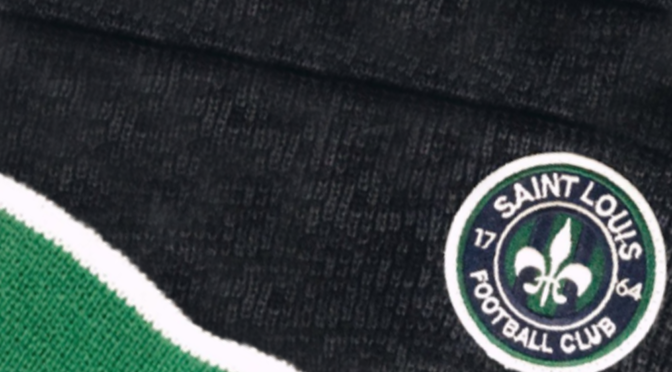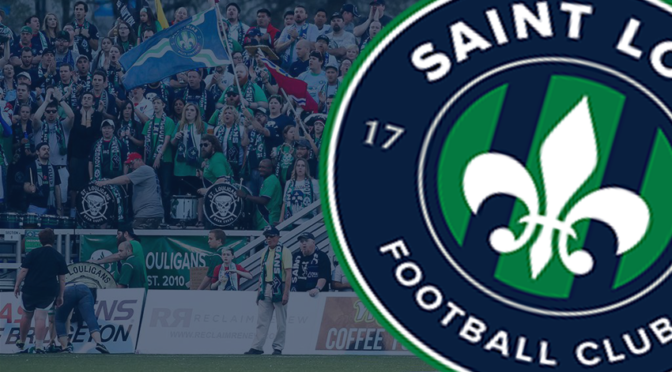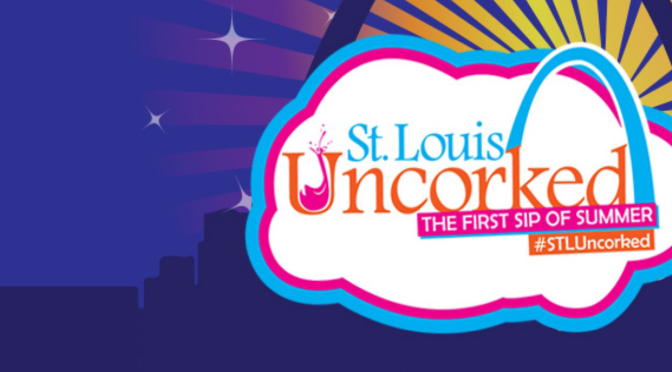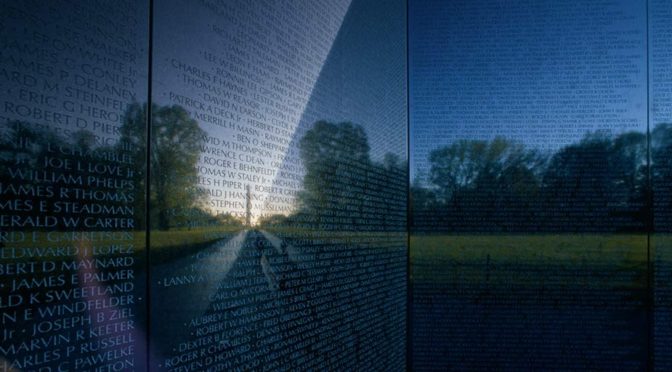Take It from a St. Louis Fan: MLS Proposal Is Good For St. Louis
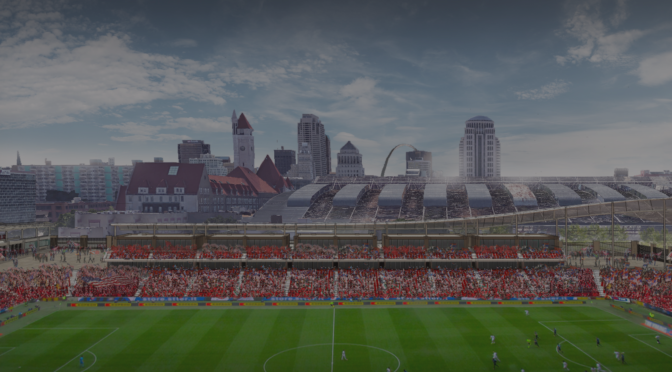
I’m Not Telling You How To Vote, But MLS2STL Deal Is Good For City of St. Louis
Hopefully you’ve heard by now that there’s a big vote coming up in the city of St. Louis on April 4. The city of St. Louis will very likely elect its first female mayor, Lyda Krewson, which is pretty darn cool. Also on the ballot is a proposal that will authorize funding for a 20,000 -seat outdoor stadium and bring a Major League Soccer (MLS) team to St. Louis.
Now there are other important things on the ballot Tuesday as well, but that’s not the point of this post. The point I’m trying to make is that this stadium proposal, MLS2STL for shorthand, is good for the city of St. Louis and the people in the city of St. Louis.
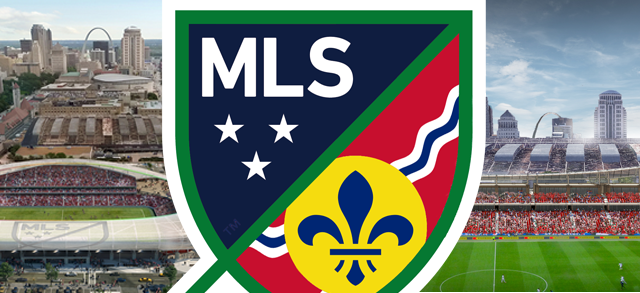
Let me start off by saying that I’m not a resident of the city anymore. I lived in the city for seven years before life took me out of the city limits. I may not be an expert on much, but I am basically an expert on paying sales tax to the city of St. Louis. While living in the city I rarely left the city. I also don’t really cook so, I spent an inordinate amount of money in the city.
That being said, it’s not my place to tell residents of the city of St. Louis how to vote come Tuesday. I will say that I strongly feel that this MLS2STL proposal is good for the city of St. Louis.
The Basics of MLS2STL
Proposition 2 is MLS2STL. It’s tied to Proposition 1, otherwise known as the MetroLink tax. Proposition 2 doesn’t happen without Proposition 1 passing, meaning two “YES” votes are needed Tuesday for the stadium to happen.
Proposition 1 would raise the sales tax in the city of St. Louis one half of one percent. The increase would go to “economic development purposes,” according to the ballot language. Those purposes include workforce development, public safety, and infrastructure upgrades. The most well-known project the money would go to is the North/South MetroLink Extension.
By law the use tax increases when the sales tax increases. The use tax is paid by businesses on out-of-state purchases. No purchases are taxed with both. The sales tax increase would bring in an estimated $20 million a year, while the use tax increase would bring in an estimated $4 million a year.
A .5% increase means you would pay 50 cents more on a $100 purchase. The sales tax rate in much of the city is 9.679%. The tax rate on most grocery purchases is 6.679%.
The use tax increase would be used to secure $50 million in bonds for construction of the stadium. Another $10 million would be contributed by the city from the reimbursement of sales taxes generated by the stadium.
Only money from the use tax increase can be used for the stadium. If the revenues from that 0.5% increase fall short, the owners of the team (SC STL) are obligated to cover the difference. SC STL is also on the hook for any construction cost overruns, stadium maintenance and upgrades.
The details of the financing are laid out in Board Bill No. 290.
SC STL would be paying at least $95 million toward the stadium’s cost. They would also cover the $150 million MLS expansion fee and fund the team’s operations.
SC STL would also pay the city to rent the stadium for its games. A non-relocation clause is included in the Board Bill.
SC STL is comprised of investors including Jim Kavanaugh, Paul Edgerley, David Peacock and Terry Matlack, Issac Bruce and others.
Why Is MLS2STL Good For St. Louis?
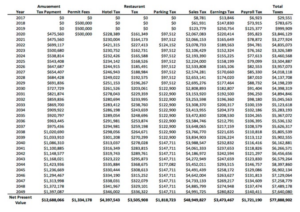
In my opinion, MLS2STL is a good deal for the city of St. Louis because it will give the city the benefits afforded by having this stadium and team while generating more than the initial investment that can be used for other city services.
An analysis of the economic impact of MLS2STL prepared by Missouri Wonk projects a return to the city of $77.9 million (net present value) over the next 33 years. This return wouldn’t come all at once, a portion of that would be generated each year.
The study also projects that the project will add $406 million (npv) in labor income and $556 million (npv) in value to the economy in the city.
While the success of the future St. Louis MLS team will play a large part in whether those numbers pan out, the success of other events in the stadium will also matter. I previously wrote about some examples of other events that this stadium could host.
St. Louis is well-suited for success in that department with the St. Louis Sports Commission. The organization has been named the commission of the year three times by the National Association of Sports Commissions. The organization most recently brought the NCAA Division 1 Wrestling Championships to town earlier this month and will bring the Women’s Gymnastics Championships to Chaifetz Arena in April. They fill downtown each year with Arch Madness, the Missouri Valley Conference Men’s Basketball Tournament, and next year will also bring the SEC Men’s Basketball Tournament to town. The SEC Tournament will feature the Missouri Tigers and the likely #1 pick in the 2018 NBA Draft, Michael Porter, Jr.
Another card St. Louis has in its pocket is U.S. Soccer CEO/Secretary General Dan Flynn. Hosting meaningful U.S. Men’s and Women’s National Team games would be a huge win for St. Louis. Flynn is on record saying his organization can’t host any more games in St. Louis now because the converted playing field at Busch Stadium isn’t suitable. Flynn happens to be from St. Louis and played for Saint Louis University, winning the 1973 NCAA Championship.
Brian Schmidt is the owner of Missouri Wonk and signed the projections that his firm provided for MLS2STL. He was formerly the executive director of the Missouri General Assembly Joint Committe on Tax Policy, according to his LinkedIn profile.
Patrick Rishe, the President of Sportsimpacts, agreed that the MLS2STL deal is a fiscally responsible one for the city of St. Louis in a piece for Forbes. Rishe is the Director of the Sports Business Program at Washington University here in St. Louis. It’s been alleged by opponents that Rishe only supports the deal because he took money at one point as a consultant for SC STL. To suggest that Rishe would jeopardize his employment at Washington University and his entire reputation for this is ludicrous.
SC STL also recently announced a Community Benefits Agreement that it had negotiated with the city. Among other things, the agreement includes a committment of at least $5 million from the group to grow youth soccer in the city, 100 free tickets for each game to area community organizations and job training for young adults in the city. Groups involved in the partnership included the Boys and Girls Club of Greater St. Louis, the Mathews-Dickey Boys & Girls Club, The Little Bit Foundation, and others.
Demetrious Johnson’s organization is also included in the agreement. Johnson, who grew up in St. Louis’s Darst-Webbe Housing Project before playing football at Mizzou and in the NFL, recently penned an essay urging YES votes on April 4th.
Johnson talked of the opportunities that will be made available for city youths with the proposal’s passing.
If we vote yes on Propositions 1 and 2, we will provide our city youth with opportunities to build character and realize a future that is full of promise, not despair. The diversity of our community will be celebrated and become the asset it should be at all times, not just when we have something to announce. And we will again have the opportunity to stand up and show the world that St. Louis will not be defined by what we have lost, but instead by what and who we aspire to become.
Johnson’s upbringing and charitable endeavors have earned him your ear on this, don’t you think?
The Future Of MLS & The History of St. Louis Soccer
MLS commissioner Don Garber was in St. Louis earlier this week to attend an MLS2STL rally at Ballpark Village. While here, he revealed that when the MLS formed in 1996 they wanted St. Louis to be a part of the league. They’ve wanted to add a team in St. Louis ever since, but hadn’t been able to find the right ownership group until now.
St. Louis came close to getting a team in 2007 when Jeff Cooper almost bought Real Salt Lake with plans to move them to St. Louis. He had grand plans to put a team in a new soccer development in Collinsville.
His grand plans blew up in spectacular fashion in 2010 when two of his investors disappeared. The loss of funds led to the mid-season folding of the women’s professional team he owned as well as the folding of the lower-level men’s team he owned.
No other city in America can match the soccer history of St. Louis. That history has been chronicled in a book by Dave Lange and the city’s link to the 1950 World Cup team was featured in a movie starring Gerard Butler.
Attendance at MLS matches has grown from 17,406 in the league’s ten-team first season in 1996 to 21,692 last season with 20 teams. Attendance in Seattle has averaged more than 36,000 per game each season since 2010. 55,297 fans showed up in Atlanta for the expansion team’s first game this season. 35,043 were on hand to watch Minnesota United play its first game in the snow.
MLS has announced that it will expand by four team in the coming years. The league received 12 bids for expansion, of which St. Louis’s was one.
It’s Not City Services OR MLS Stadium
Opposition to MLS2STL largely focuses on the idea that the city’s funds should be used for city services. No one is saying that using the funds for this stadium is more important than the city providing services. The idea is that the funds can be used for the stadium AND to provide those city services. Those tax dollars returned to the city each year from the stadium will go right into the city’s general revenue fund and can be spent however the Board of Aldermen and the mayor choose.
If the MLS2STL projections hold true, the city would end up with more money each year for those services than they would have had otherwise and get the benefits that the stadium and MLS team bring.
But The Studies Say
Opponents of this projects have also been known to claim that studies have consistently shown that the public funding of sports stadiums is a bad deal for taxpayers. It is true that there are multiple reports out there saying this. The problem is though that none of these studies deal with a deal like this.
Take this report out of Stanford that’s often thrown out. It deals with NFL stadiums across the country that involved hundreds of millions of dollars in public funding. It’s a pretty simple idea that it’s much easier to see a positive return on a deal that involves $60 million, like MLS2STL. There are also many more events that can use a 20,000-seat stadium versus a 60,000 seat stadium.
As a local example, take the Missouri State High School Activities Association Football Championships. The event was held from 1996-2015 at the Edward Jones Dome, but with the Rams leaving, MSHSAA also moved its event and held it in Columbia last year. Children’s Mercy Park, home of Sporting Kansas City, has hosted the D-II Football National Championship the last two years. Holding this event at the new stadium would address concerns from coaches that they were playing their biggest game of the year indoors. Plus, Missouri is not Texas. 54,347 people aren’t showing up to watch high school football.
That Stanford study also claims that the Rams leaving St. Louis left behind an obsolete stadium.
That would be news to the St. Louis Convention & Visitors Commission, which estimates conventions at America’s Center bring in an estimated $23 million each year to the state, city and county.
That’s not the only thing these studies get wrong about St. Louis.
Take this 2001 study from the Federal Reserve Bank of St. Louis.
First off and to an earlier point, the first soccer-specific MLS stadium didn’t appear until 1999 (Columbus) and the next one didn’t come on board until 2003 (Los Angeles) so, a study that looks at stadiums built or refurbished between 1987-1999 can’t possibly include data on a stadium like the one proposed in St. Louis.
Back to why St. Louis is different.
In St. Louis we have this dumb city-county divide. Everything goes back to The Great Divorce. It affects schools, police, crime reporting, businesses, funding for regional amenities, etc. It’s been that way since 1877.
With St. Louis as an independent city, that means that money spent outside the city limits doesn’t benefit the city of St. Louis. Many of these stadium studies conclude that money spent at sports stadiums is money that would be spent elsewhere in the area.
Locally, that means that most of the money spent at the stadium would be spent outside the city limits if not for the stadium. To give you an idea of how much that means, the St. Louis Cardinals estimate that 90% of their attendance comes from outside the city limits.
From the opening of the new Busch Stadium through 2015, the Cardinals paid almost $121 million in taxes directly to the city of St. Louis. That’s an average of $12 million per year that the city can spend on services and roughly $11 million of which per year that would have ended up in some other city or county’s coffers.
Other cities don’t have to deal with this divide and thus, studies on their stadiums don’t take it into account.
Stan Kroenke Is Not Involved
Stan Kroenke is not involved in SC STL. He has nothing to do with MLS2STL. Our buddy Enos owns the Colorado Rapids of MLS. His team will be our enemy and the St. Louligans will make up glorious chants about him that 20,000 fans will shout in unison when the Rapids come to town.
That’s it.
Pieces of opposition that spend way too many words talking about Stan Kroenke, like this one recently published in the Riverfront Times, should give you a hint that maybe the author isn’t exactly looking at this deal with an open mind.
I don’t know how else to put it. Stan is not involved. This is not an NFL stadium.
My Final Plea
Like I said at the beginning, I am not going to tell anyone how to vote. I just ask that you look at this deal with an open mind.
Don’t be swayed by cheap attempts at clicks.
Read what people like Bejamin Hochman have to say. I repeat, read what people like Hochman have to say. Hochman isn’t your jam? Read what Jeff Gordon has to say.
Listen to the passionate fans and what St Louis soccer stars like Taylor Twellman have to say. Read what St. Louis native and LA Galaxy president Chris Klein (not the actor) has to say.
Read what the passionate fans have to say.
Read what Demetrious Johnson has to say. Read the words of Solomon Alexander from the St. Louis Sports Foundation.
If after all that you still really think that you should vote no, that’s fine. No one will know your vote on April 4th except you. There won’t be anyone shouting over you to make their point. There won’t be anyone on social media accusing you of not being able to read.
Fill in whatever bubbles that you feel are best for the city of St. Louis and its residents.
That’s my final plea. Have a great weekend.
I’m going to spend money in the city of St. Louis this weekend and have beers in the parking lot before the Saint Louis FC game Saturday with Jim Kavanaugh and Paul Edgerley because neither of them are Stan Kroenke.
I leave you with video of Taylor Twellman earlier this week when he was in St. Louis.
Brought to you by Mills Apartments


